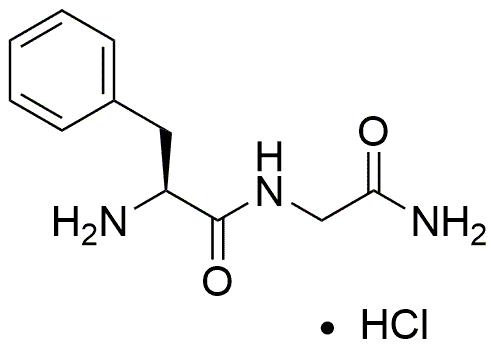Phe-Gly-NH2·HCl is widely utilized in research focused on
- Peptide Synthesis: This compound serves as a building block in the synthesis of peptides, which are crucial for developing new drugs and therapeutic agents.
- Biochemical Research: It is used in studies related to protein interactions and enzyme activity, helping researchers understand biological processes at a molecular level.
- Pharmaceutical Development: The compound plays a role in formulating medications, particularly in targeting specific receptors in the body, enhancing drug efficacy.
- Cosmetic Formulations: It is incorporated into skincare products for its potential benefits in promoting skin health and hydration, appealing to the cosmetic industry.
- Food Industry: Phe-Gly-NH2·HCl can be used as a flavor enhancer or additive, improving the taste profile of various food products.
General Information
Properties
Safety and Regulations
Applications
Phe-Gly-NH2·HCl is widely utilized in research focused on
- Peptide Synthesis: This compound serves as a building block in the synthesis of peptides, which are crucial for developing new drugs and therapeutic agents.
- Biochemical Research: It is used in studies related to protein interactions and enzyme activity, helping researchers understand biological processes at a molecular level.
- Pharmaceutical Development: The compound plays a role in formulating medications, particularly in targeting specific receptors in the body, enhancing drug efficacy.
- Cosmetic Formulations: It is incorporated into skincare products for its potential benefits in promoting skin health and hydration, appealing to the cosmetic industry.
- Food Industry: Phe-Gly-NH2·HCl can be used as a flavor enhancer or additive, improving the taste profile of various food products.
Documents
Safety Data Sheets (SDS)
The SDS provides comprehensive safety information on handling, storage, and disposal of the product.
Product Specification (PS)
The PS provides a comprehensive breakdown of the product’s properties, including chemical composition, physical state, purity, and storage requirements. It also details acceptable quality ranges and the product's intended applications.
Certificates of Analysis (COA)
Search for Certificates of Analysis (COA) by entering the products Lot Number. Lot and Batch Numbers can be found on a product’s label following the words ‘Lot’ or ‘Batch’.
*Catalog Number
*Lot Number
Certificates Of Origin (COO)
This COO confirms the country where the product was manufactured, and also details the materials and components used in it and whether it is derived from natural, synthetic, or other specific sources. This certificate may be required for customs, trade, and regulatory compliance.
*Catalog Number
*Lot Number
Safety Data Sheets (SDS)
The SDS provides comprehensive safety information on handling, storage, and disposal of the product.
DownloadProduct Specification (PS)
The PS provides a comprehensive breakdown of the product’s properties, including chemical composition, physical state, purity, and storage requirements. It also details acceptable quality ranges and the product's intended applications.
DownloadCertificates of Analysis (COA)
Search for Certificates of Analysis (COA) by entering the products Lot Number. Lot and Batch Numbers can be found on a product’s label following the words ‘Lot’ or ‘Batch’.
*Catalog Number
*Lot Number
Certificates Of Origin (COO)
This COO confirms the country where the product was manufactured, and also details the materials and components used in it and whether it is derived from natural, synthetic, or other specific sources. This certificate may be required for customs, trade, and regulatory compliance.


